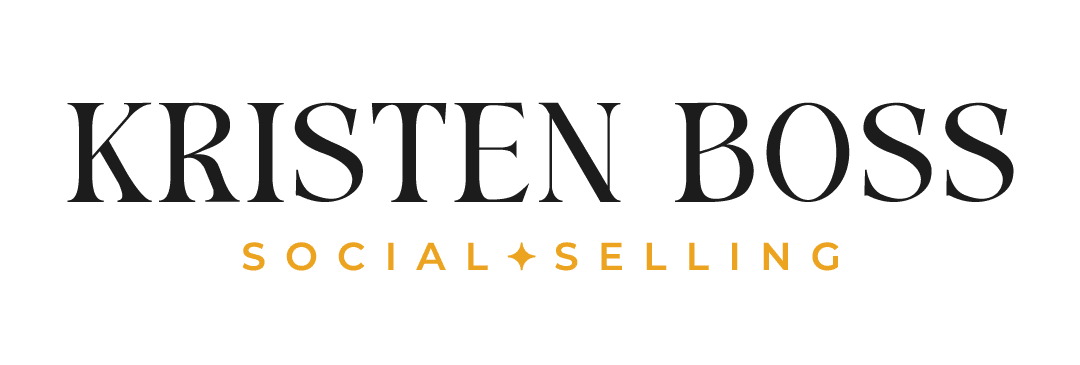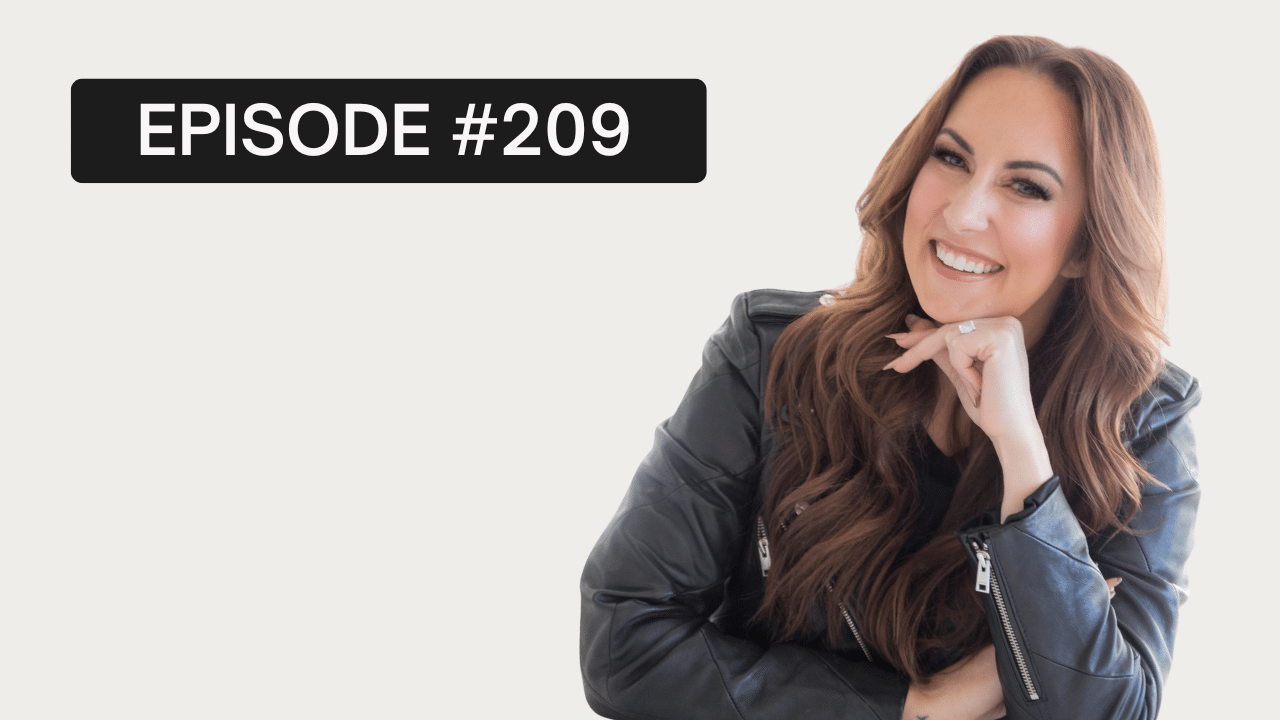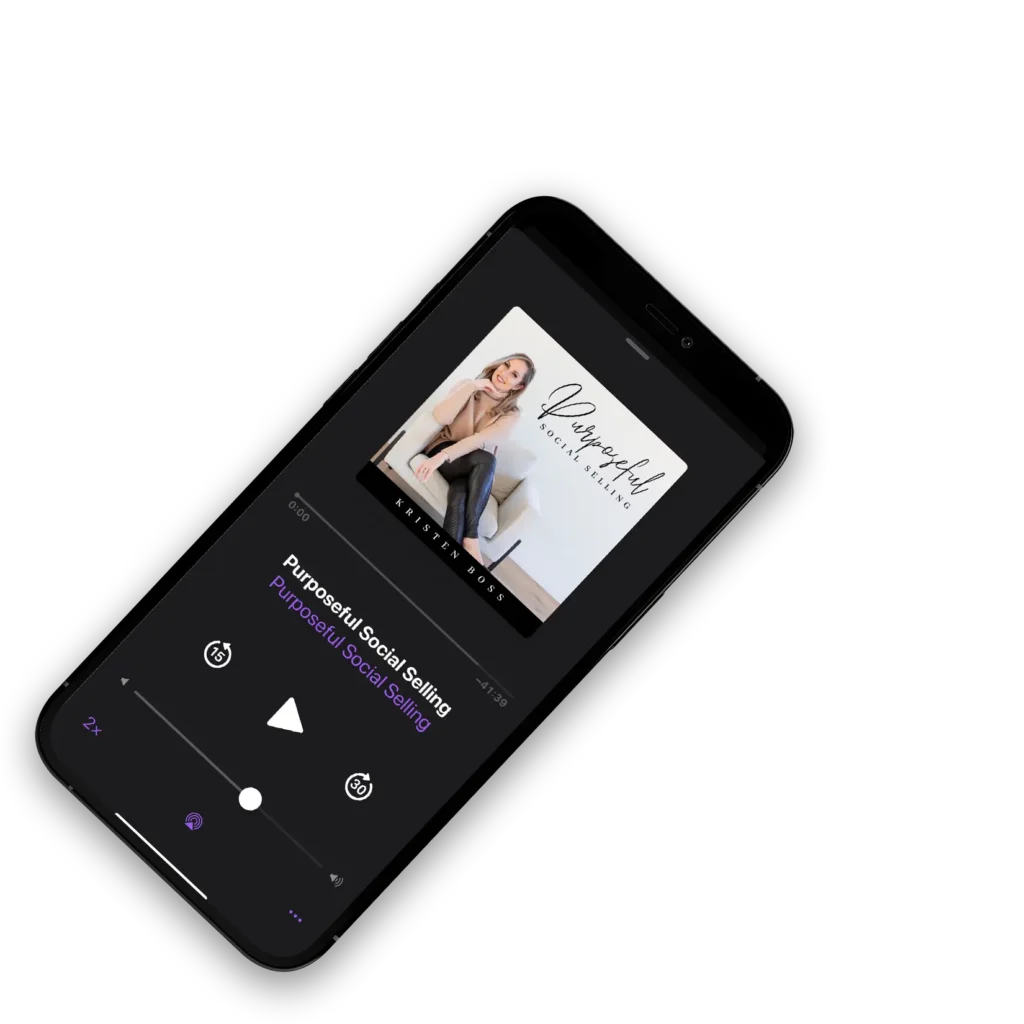What does the most successful version of yourself look like? We’re not talking about mediocre success. No- we’re talking extraordinary, outrageous success. The kind of success that almost feels arrogant and uncomfortable.
Can you picture it? Good.
Now think about how this version of yourself will change your life as you know it. Will you lose friendships because of this success? Will you alienate family members who don’t want to hear about how successful you are? Will you be judged by others? These are all things that can hold you back from even attempting to reach those goals.
In today’s special 100th episode, Kristen is talking about safety and how the (sometimes unknown) fear of isolation caused by enormous success can stop you in your tracks before you even get started. Strap in for a vulnerable take on a lesson Kristen learned the hard way.
Here are this week’s takeaways:
- How feelings of being unsafe in your success can trigger self-sabotage
- Why you create emotional safety in the pursuit of your goals
- The importance of learning to calm your emotional/physical response to taking extraordinary risks
- Why you feel exhausted for weeks after going for a big goal
- How having a CEO mindset can shift your level of commitment to your business
Self-sabotage is real. The good news is that it’s fixable. When you learn to support and love yourself, even at peak success, you’re creating safety surrounding the risk. Instead of letting negative thoughts run the show, you can practice creating safety ahead of time so that when the time comes for you to move into the most successful version of yourself – you’ll be ready.
If you’d like to join the launch party for Kristen’s new book Pivot to Purpose: Leaving the Toxic Hustle Culture Behind, you can click here to join the list and pre-order your copy today.
Thanks for listening! Do you have a question about network marketing? Kristen can help! Drop your question here, and she just might answer it live on the podcast: https://kristenboss.com/question
Connect with Kristen:
If you’re ready to learn the simple process of running your social selling business online, you have to check out Kristen’s live group coaching program! The Social Selling Academy: www.thesocialsellingacademy.com
Do you have a business full of customers and almost no builders? You’re in need of a reboot! Learn the three skills you can learn that will completely change your recruitment game. Check it out here.
Transcript for Episode #100 Safety and Success:
Kristen Boss (00:05): Welcome to Purposeful Social Selling with Kristen Boss. I’m your host, Kristen Boss. I’m a mindset and business coach with more than 15 years experience in both the product and service based industries. I believe that social selling is the best business model for people wanting to make an impact while they make serious income. This is the podcast for the social seller, who is tired of feeling inauthentic in their business and desires to find a more purposeful and profitable way of growing their business in today’s social media landscape. In this podcast, you will learn what it takes to grow a sustainable business through impactful and social marketing. It’s time to ditch the hustle and lead from the heart. Let me show you the new way.
Kristen Boss (00:49): Hey bosses. Welcome to another episode of the podcast. Welcome to episode 100. This feels like such a huge accomplishment. I’m so proud. I’m so excited. I made it to a hundred episodes and I will tell you, there were definitely weeks when I was like, I have nothing to talk about. I don’t know what to talk about, but you know what? As I continue to serve my community, serve my students. I always have something to talk about and there’s always genius to share not to call myself a genius, but really just honoring that I have value to share. And I, and I think there’s a lesson there for you because I think a lot of times people think, you know, I don’t have anything substantial or valuable to share with people and they tend to judge themselves with how they show up online, how they show up in, or, or even maybe in your workspace or, you know, with your family.
Kristen Boss (01:43): Maybe you are someone that chooses to quietly be in the background because you feel that you don’t have a valuable contribution to make to others or to the conversation you just quietly hide until either someone asks your opinion or wants to know. And what I want to offer you with this is I really want you to offer, I, I want to offer you to consider how you have more value than you give yourself credit for and how you can contribute to conversations, and how it’s safe for you to do so, how it’s okay for you to do so. I really think this concept of taking up space in the world is so important. It’s really important work for us. And I think there are so many people out there that are so afraid to take up space in the world, by sharing what they really think and saying how they feel and asking for what they need without feeling guilty or putting a healthy boundary in place.
Kristen Boss (02:45): It’s just, I think we live small because we’re afraid that by us living big we’re encroaching on somebody else’s space or, you know, their ability to live big. And I really just want to offer you that when you take up space, it doesn’t encroach on others. In fact, it invites them to take up space too. It’s the ultimate expression of feeling at ease with yourself and feeling safe to be who you are in the world. And, you know, you’re feeling that way when you feel like I can contribute to this conversation. Now some of you might have the lens of like, well, do I, am I going to say the right thing? Am I going to offend somebody? What if I say it wrong? And because you have all those filters in place for fear of saying it wrong, looking dumb, looking inadequate, you just shrink instead of, you know, I’m willing to speak my mind and take up space and maybe someone doesn’t it.
Kristen Boss (03:39): Maybe someone doesn’t agree and I’m okay with that. So this is kind of a tangent I took, but I think it’s important. I want to invite you today to take up space. And I want you to think of a, a specific area in your life where you know that you hide, you shrink back, you don’t offer your opinion. You don’t boldly come in and say, Hey, you know what? I, I have something I’d like to add to that. Or if you do say something, you start the conversation with, I’m sorry. Or can I just almost like asking for permission to exist in the room instead of assuming that you belong in the room and I’m not sure where you might be doing that in your life, but I just want to offer you to step into being somebody who can take up space in the world and how someone is waiting for you to take up space, how you’re taking up space in the world is going to bless somebody and someone needs to see you do that so that they feel like they have permission to do so as well.
Kristen Boss (04:41): It’s kind of fun kind of along that light, you know, I’ve had some friends that have now watched me for the past few years and they see my business as it is now. They see the book is coming out and that I’m doing keynote speaking and, and they see, and now it’s so fun cause I do have friends, you know, it’s just the other night I was, you know, doing the mom thing, shopping at target at nine o’clock at night. And I had a friend call me at nine o’clock at night. I was like, Hey, what’s going on? She’s like, I have an idea. I’ve watched how you’ve served your audience. And I know, I know I can serve my audience and I know there are problems I can solve in the world and I’m really good at it. And she was a coworker of mine.
Kristen Boss (05:25): We did hair together for a while and she’s really good at weddings and in the being in the wedding industry. And we were just talking about that and it was so fun to hear her sit in the belief of, I have something really valuable to offer this world and I’m going to be brave. And I’m going to find a plan to figure out how to get this in front of the right people and how I’m going to serve people. And it was just really beautiful to watch my friend be willing to take up space in the world and think, Hey, I can maybe do this too. And I think sometimes as women, we shrink back and we think, you know, our success is going to be off putting to people and it might for some, it might for some, but there might be other people who watch what you’re doing in the world and say, thank you.
Kristen Boss (06:09): I want to do this too. Now I am inspired to do brave, hard, crazy, scary, extraordinary things because I’ve watch watched you do it. And sometimes people just need to watch others go first. And I think that happened with a few of my friends. They’re like, I just had to watch you go first. I had to make sure that you survived and it’s, it’s great. And so it’s fun seeing my friends step into that. So all of that to say is this episode is about the concept of, of safety and success and how they relate to one another and how it’s so important out of all my episodes. This might be, and maybe I’ll feel this feel differently in the future, but this might be one that feels most raw, most true to my heart, most vulnerable. And the message I want you to hear so deeply today and it how your safety, you learning to create safety for yourself is vital imperative and necessary in order for you to have the success that you want it.
Kristen Boss (07:20): And I’m just curious if you were to think about your most successful self, the part this I, I just want you to almost get outrageous with yourself. I want you to think of like the most extraordinary, most successful version of you in the world almost to the point where you feel UNC comfortable envisioning that part of you. I want you to go so big to where your brain thinks. Ooh, that feels a little, I don’t know. Is that like braggadocious? Is that arrogant? Is that too big? Great. There go all the way there and be that person like think like get into that person’s brain. How are they moving around in the world? Where are you living? What are you doing? How are you spending your time? What conversations are you in? What does your marriage look like? Are your partnerships look like, I really want you to sit down and like envision that most successful version of you.
Kristen Boss (08:15): And then I want to ask you, do you feel safe becoming that person? What comes up for you? If I was to say, so, go be that. And if you had all these stories, like, no, I can’t it’s I mean, it’s nice to dream, Kristin. I can’t do that. I mean, you don’t know me, you don’t know the stories. We kind of default to the stories that kind of bring us back to reality that brings us back to our current story and, and how we see ourselves in the world right now and today. But I just want to picture, I want you to go back to picturing that really successful version of you. And I want you to think about when it comes to safety and you thinking about being safe, being that person.
Kristen Boss (09:04): I want you to think of safety in all terms like are, do you love yourself? Do you feel safe to move in the, around in the world, being that person? Do you feel safe around your friends? Do you feel safe around your family? Do you feel safe around former colleagues? Do you feel safe around your neighbors, safe in the sense of belonging safe in the sense of it’s okay to be me. It’s okay for me to think this way and move about the world in this way. And I can be loved. This version of me can be loved, can be seen, can be known. That’s the safety I’m talking about. I’m not talking about, you know, the threat of your wellbeing and your livelihood. I’m not talking about, you know, life or death safety. I’m talking about the deep sense of emotional safety and feeling at home in your own body, feeling safe to exist in the world as your most fulfilled self, that safety in the context of like of your success. And if that doesn’t feel safe to you, if suddenly all of the stories come up in your mind of people who might not love you, who might judge you of people who might ostracize you, push you out, have stories about you, places you, you might no longer feel welcome the dynamic you think it might, that it might change in your friendships. You think, oh, I won’t be able to go to girls nights anymore because they won’t want to hear about this part of my life.
Kristen Boss (10:54): Like I really want you to get so specific and think, where do I not feel safe? Where do I feel? And safe in the sense of like my sense of belonging because in our most primal brain, when we don’t feel like we have belonging, isolation is truly terrifying because our primal brain and cave man days isolation meant death. You needed your tribe in to survive. You needed to be in a group where there was shelter and food. And we, we survive. Humans survive in those structures. We’re not made to live alone in life. And if you believe that having all the success in the world is going to leave you alone and isolated, then none of that feels safe. So you could say all day, I want that goal and that vision, or I want to do those things. But somewhere deep in your mind, if there’s fear of I’m going to be alone.
Kristen Boss (11:55): And I won’t, that version of me will be less lovable, will belong less. I don’t care what your goals are. What strategy planner you have, what coach you have, what program you’re in, none of that, you will not allow yourself to have success because it feels like a threat to your existence on a deeply subconscious primal, psychological level. You can sit there and say, no, I want it. And I’m deserving and I’m worthy. But if you haven’t sat down with yourself and been like, but is that true? Do I actually believe I’m going to be okay, existing in the world is that person then what’s going to happen is you’re going to sabotage any time you have a measure of success that brings you closer to that version of you, even if it’s far away. So for example, let’s just say your most successful self is making a million dollars a year.
Kristen Boss (12:48): And for you, maybe for you, it’s not a monetary my most successful version of me. Maybe it’s not a monetary goal, but sit with me in the monetary analogy, maybe your most successful self, the most successful version of you makes a million dollars a year. And right now you’re making $50,000 a year. And if you have stories like I will not be loved within my family or, you know, my aunt Sue at Thanksgiving is going to have all kinds of things to say about me, my cousins, aren’t going to invite me to Christmas. My, my friend, who I, you know, has, you know, is always talking about capitalism and, and you know, and wealth and all those things. Like I won’t be welcome to be. She won’t want to be my friend anymore. She won’t love me. My marriage will feel unsafe or whatever it is. Okay.
Kristen Boss (13:36): Even if that’s at a million dollars, let’s say, for example, you, all of a sudden you were to make, you know, a hundred K a year. You were to do a quantum leap, maybe even like 150 K a year, you have massive success. And in your accomplishment of 150 K a year, you feel a, it brings you closer to that future million dollar version of yourself. And if the future million dollar version of yourself does not feel safe to operate in the world, you taking one step closer to being that person means you are feeling less safe even now. And this is when people start to sabotage themselves. This is when I see people have massive success in their business, massive success in their team or their organization. And then suddenly they start sabotaging themselves. It’s almost like they, they, they can’t tolerate the success because it triggers safety for them.
Kristen Boss (14:35): It triggers I can be this person. Oh no, I’m one step closer to becoming that person. And it doesn’t happen on a conscious level. It happens on a subconscious level. If you have not read the book, the big leap, you need to read it because he talks about this, this idea, this concept of your upper limit, like how, how much you can, how much joy, how much happiness, and how much fulfillment will you allow yourself to tolerate in the world? I was asking a student in the academy, who had extraordinary wins. Like she surpassed her goals, well surpassed her goals. And she wasn’t feeling proud of herself for the goals she accomplished. And I said, why, why not? Why isn’t she willing to be really proud of herself? She’s like, I don’t know. I was like, well, I want to know what proud feels like.
Kristen Boss (15:23): And I, I said, tell me the last time you were proud. She’s like, well, it was when you know, I had a life-threatening thing happen and I stayed calm and I stayed grounded and I didn’t worry. And I really just stepped into my role of being a present mom. I’m so proud of how I showed up. I was like, okay, as you’re telling me that, how is that feeling? She’s like, well, it feels light. And fluttery in my chest. It feels like such a good feeling. I was like, okay, why aren’t you letting yourself have this feeling with your goals in your business? This that you just surpassed. And after a lot of digging, we realized it was because this idea of like, if I let myself feel so much joy, then I’m going to be so afraid of what happens when it’s gone.
Kristen Boss (16:04): Like, if I experience a high, then I’m afraid of the low that’s coming. It’s like, I’m going to protect my myself. If I don’t let myself get too happy in life, then it’s going to hurt less when I get disappointed. So I’m just going to keep myself from being somebody who lets myself feel joy at the greatest possible level, because I’m afraid of feeling despair or disappointment or discouragement at an equal and opposite, like having an equal and opposite experience. Like I won’t survive the lows, but you will like, I want the full human experience. I hope you want it too. Like, I want the highs. I want the lows. I don’t really want the lows, but I’m willing to feel the lows. I’m willing to feel the lows in order to really, I don’t know, feel more gratitude for my life. And I’m willing to feel all the lows to, to have the things or to accomplish the things I want to accomplish in this world.
Kristen Boss (17:04): And we’ll talk more about that. But this concept of like, this is when people sabotage themselves when they’re like, they can’t handle it, they don’t feel safe with success. That’s why I’m asking you, like, do you feel safe being, and operating as that person in the world? Okay. I’m talking about safety when you have success, but now I’m going to talk about safety with where you are right now, as you’re, as you’re on the path to going for goals, accomplishing your goals. I want to talk about why safety matters now and why you learn to create emotional and mental safety for yourself in the pursuit of doing hard and extraordinary things in the world. And here’s why it’s so important in order to, you know, do extraordinary things in the world, especially in the world of entrepreneurship, it requires risk. You will always be taking risks in business.
Kristen Boss (18:08): And risks never feel good. They flood our nervous system with a sense of uncertainty and uncertainty. Again, in our primal brain, feels like a physical threat to us. Uncertainty equates death, because if you cannot predict the outcome, then I cannot prepare myself for worst-case scenario. And that must mean death. So our nervous system, and if you’re like, Kristen, what do you mean our nervous system? I’m talking about like how you, how you emotionally and physically experience an emotion. It’s like, it’s, you’re breathing. It’s what you feel happening in your chest. It’s your pulse. It’s your pupil, dilation. It’s all those things. It’s a nervous system response. And you have nervous system response. Like I’m going to give you a great example. I want you to picture somebody who’s who you really admire. And someone who’s really important to you. And I want you to picture all of a sudden, outta nowhere.
Kristen Boss (19:04): Like let’s say your boss and you get a text that just says we need to talk. And that’s all you get. If you are like me, your nervous system goes haywire. You start like you feel your chest starts to tighten. You have shortness of breath. You start to feel a little fluttery your, you start to, you know, your body starts to tighten you. You feel panicky, want kinda want to crawl outta your skin. That is a nervous system response. That is your body in some sort of fight or flight state, cause you’re thinking, oh my gosh, they’re going to tell me something bad. You’re bracing yourself for bad news. That’s a nervous system response. So when I talk about creating safety, I’m also talking about creating safety in your nervous system while you are taking extraordinary risks, do extraordinary things in the world. And when you do extraordinary things in the world, your nervous system is going to have a thing or two to say about it.
Kristen Boss (20:00): When you feel fear, when you are afraid of rejection, your nervous system will have a response to that. You’ll feel the threat, the worry your body might start pumping out adrenaline. Like this is a nervous system response or someone, maybe you, you enter into conflict with somebody or conflict res resolution. Like some of you’re like I avoid conflict at all costs. And what I would offer you is you only avoid conflict because of how you experience conflict in your nervous system, because it puts you in a fight. Flight state feels like a perceived, perceived threat. Your adrenaline is just going through your body at a million miles an hour. You feel like you’re going to die because really physically it does feel that way. But there is a way to experience it differently. If you can learn to calm yourself and create safety in those conversations, just, just like creating safety in your business. So here’s an example.
Kristen Boss (20:59): I want you to imagine a big goal that you’re going for. Oftentimes I feel like the easiest analogy for me to give you since the majority of my audience is social sellers, network marketers. I want you to picture going for the next big rank. Okay? A rank advancement for coaches for you. It might be, you know, a big launch. It’s almost identical that it’s, it is identical. A coach launching and a network marketer rank advancing it’s this so many similarities. So I want you to picture a rank advancement and learning to create safety with the rank. Advancement is how you experience the rank advancement in your body and in your mind and in your emotions while you are going through it all month because it could be an experience where your adrenaline is going all the time. Your anxiety is through the roof. You’re constantly fixating.
Kristen Boss (21:53): You’ve lost your appetite. You’re not drinking your water. You’re not sleeping. You’re a stress case. This is a nervous system response because it’s a nervous system response and a freak-out response because it’s like, if I don’t hit this goal, whatever you, you make that mean as what you are afraid of. So if you’re like, if I don’t hit this goal, then I’m never going to get it or I’m not going to get the pay bonus. I’m not going to go on the trip. I’m not going to get recognized. It’s on stage at convention this year, whatever story you tell yourself, that’s having you experiencing an intense emotional state while you are in pursuit of the goal. And so while you’re in pursuit of the goal, this is why most people are exhausted after going for a big push for the next rank. And they feel the need to recover for two weeks after because their adrenals are shot.
Kristen Boss (22:45): They go, they just pump out adrenaline all month and stress and their cortisol levels are so high. And then they like need to sleep for a week. It’s because their body was literally in that like heightened state of, you know, fight or flight. I have to make this happen. All that’s going on. And oftentimes what happens is I see people not going for big goals because they haven’t learned to create emotion, safety for themselves when they miss a goal. And what that looks like is when you miss a goal planning ahead of time, how you’re going to treat yourself when you fail emotional safety with yourself, I want you to imagine being in a room with somebody, getting in your face and pointing their finger at your face and like saying, you know, you’re not enough and you didn’t do a good job and you don’t have what it takes and you don’t have influence.
Kristen Boss (23:43): And you’re never going to get there. I want you to picture like when you, when someone’s in your face, pointing your finger, like your, again, your body’s like this is a threat. This is awful. I need to run away. And we do this to ourselves, with our self-talk. When we experience failure, this is why I see most people do like they’re there just beating themselves up and making the failure mean something is wrong with them as a human, where they feel, they start to assign the, they assign failure to themselves as an identity problem. Like I failed. I’m a problem. I’m unworthy. I’m not a good leader. Something is wrong with me. And, and then they’re in a shame storm and shame how we experience shame in the body. We actually experience it on the nervous system level as well. Shame feels awful. It feels like your chest is caving in. It feels like an elephant is on your torso. It feels so painful.
Kristen Boss (24:52): And if we haven’t learned to support and love ourselves when we have missed a goal, then what’s waiting on the other side of the missed goal is a shame storm, a nervous system, experience. That’s so unpleasant that our brain is like, you know what? Let’s just not set the goal or postpone the goal to another time where it feels less scary only because you haven’t created safety for yourself, regardless of the outcome, you have conditional safety. Like I will feel safe and proud if I hit the goal. If I don’t hit the goal, I’m going to feel awful. I’m going to shame spiral. Maybe second. Guess if I should be in this industry, still, maybe entertain going to another company like literally rock bottom thoughts that don’t serve you. This idea of like, instead of you deciding your thoughts about yourself and letting them be there and be concrete and be fixed thoughts about yourself.
Kristen Boss (25:55): I am a good leader. I have influence, I am worthy. I know what it takes to do hard things. And I’m committed to all those things. Some of you only have those thoughts about yourself when the results are in your favor, but when your team is struggling and when you’re struggling to maintain your rank, suddenly your identity is wrapped up in that. And now you’re thinking I’m a bad leader. I’m not a good leader. I don’t have influence. Instead of how is it possible? I’m a great leader. And there’s just something I need to do better in developing this particular teammate or these trainings. But when you’re making it about you as a person like something’s wrong with you, then you just sit in shame and you don’t problem solve anymore. You don’t empower yourself to be like, how can I figure this out?
Kristen Boss (26:42): What are the solutions here? But this is when I see people have conditional, conditional love for themselves. And they only believe certain thoughts about themselves. When the results are favorable, they kind of let the results, tell them how they should think about themselves. It’s no different than the scale. Are you stepping on a scale and letting the numbers tell you who you are tell you if you’re worthy, if you’re beautiful, if you’re desirable, if you’re enough, if you’re attracted attractive, like, are you letting the numbers, do the talking? Or are you saying, I don’t care? What the numbers are on the scale. They’re just none. And I’m going to get on there and I can still choose to think thoughts like I’m worthy. I’m beautiful. I matter I am attractive. I am desirable all those things. My body is good. I can like notice how you can have the thoughts regardless of the numbers on the scale.
Kristen Boss (27:44): And I see people do this with their business. They think I will believe these things about myself only when the metrics align with that. But as soon as the metrics don’t look good, I’m going to start thinking bad thoughts about myself. Want you to think about that? Can you imagine CEOs of massive, massive core after they’ve had a bad quarter? Can you imagine like the CEO in a shame spiral in his office thinking like I’m a bad CEO, I’m so unworthy I’m so you know, I’m so undeserving. I don’t know how to lead a company. He’s like, no, we’re going to get into the data, get into the metrics we’re going to solve for the, and we’re going to bounce right back next quarter. Like they don’t make it about themselves. They don’t make data mean something about them as a human or as a person.
Kristen Boss (28:37): I also notice there’s this concept of like conditional commitment. I’m only going to commit to this goal. If I know it’s a sure bet. If I know with a hundred percent certainty, cause really what you’re looking for is certainty. Kind of what I was saying earlier, uncertainty feels very unsafe in your body. So what’s interesting is you, your brain will try to find what’s certain and if it can’t find certainty, it will try to talk you off the ledge and say, let’s just cancel this. Let’s just not have this goal in place. Let’s do something else to protect you from the feelings of uncertainty, to protect you from feeling risk, to protect you from potentially feeling shame when you miss your goal. But what does it look like for you to have commitment? No matter what, like I’m holding the commitment until the last minute, the last hour of the last second of this, of this, you know, goal I’m going for, I’m going to hold this commitment no matter what, instead of I’m only going to hold the commitment when it looks promising and the moment it doesn’t look promising abandon ship and we all leave, right?
Kristen Boss (29:44): How often have you done that? How often have you gotten to the 20th or the 21st of the month? And you’re like abandon ship. Let’s start again next month. Cause there’s no way we’re going to hit the numbers. Now you, you forget that there’s compounding momentum. You’re not leaving room for magic and you’re not led, and also because you’re dropping the rope. You’re going to be further away from your goal. When you stop early, then had you just stuck with it all the way through and it would still have brought you closer to your goal.
Kristen Boss (30:15): This is why I wanted to talk particularly in this episode, episode to hundred about safety and success and why it’s so important that you learn to create safety for yourself, both in your path to success. And when you have success, I want and, and you’re probably like, well, how do I create safety? If like my, if my adrenalin is pumping and my cortisol’s going and I’m in that fight or flight stay and my body’s shaking, like how do I do that? And it’s very much like you would a child. Who’s scared. Caring for our nervous system is a lot like talking to our inner child. I’m not trying to be woo. I’m just telling you, this is what works. And you have to be with yourself, not judge yourself for freaking out. Cause if a child comes to you and says, I’m really scared, I’m scared being here.
Kristen Boss (31:10): You wouldn’t shame the child because they’re afraid you would be with them in that fear and say, okay, well what are you afraid of? And how, how are you? Okay right now. And I’m here for you. I got you. And sometimes we just need to say that to ourselves. Like I got you. I got this I’m okay. And when you’re in that when your nervous system is activated, sometimes it really just helps because your body is in a fight or flight state. It thinks a 300-pound grizzly bear is chasing you. That’s literally how your brain is operating. That’s when it helps to like slow down and take notice of what’s going on around you and breathe. Take deep, slow breaths. Cause again, in that fight or flight state, it’s rapid breaths. You can’t seem to catch your breath. Helps it. For me, it helps to put a hand on my chest hand on my belly, take deep breaths in through your nose and out through your mouth and just start scanning the room to remind you that there is no bear chasing you.
Kristen Boss (32:16): You can look around and be like, okay, I’m looking out the window and there’s a tree with snow on it, which is actually what I’m seeing right now and beautiful snowy mountains. It’s very beautiful. I live in Colorado and I love it here. And you know, you can say, and just taking notice of everything around you. Oh, and I feel this soft carpet between my toes and I’m sitting in a leather chair and just taking notice of your environment to help calm your nervous system and help you realize there is no perceived threat that’s happening. And being with yourself, being kind to yourself, and saying it’s okay, we’re safe. We’re not going to die. The world is not, I’m going to be fed. I’m going to have water and I’m going to sleep in a warm bed tonight. I am. Okay. And while this sounds simple, I promise you it’s profound.
Kristen Boss (33:13): If you can learn to do this, if you can learn to create safety ahead of time, I don’t care if it’s, if you, if it’s you going live on your social media and you’re going to talk about your business for the first time in six months, you’re going to have the same response. Your nervous system is going to be activated. You’re going to feel short of breath. You’re going to feel scared, worried, all those things. It’s a good time for you to practice feeling safety and be like, and ask yourself, how am I safe in this moment? How can I look for evidence that I’m safe? And when you can learn to create safety now, as you have success and as you meet goals, you will sit in that success and ask yourself, how am I safe now? And how am I safe to keep going? Cause I think sometimes our, our upper limit is triggered when we think, okay, okay, that’s enough.
Kristen Boss (34:04): I think I’ve had enough goodness for the day I’m and, and our worthiness comes into play like, Ooh, I’m not sure if I’m deserving of more than this. I’m not sure I’m allowed to have more than this instead of like, wow, I’m so thankful and I’m okay. It’s okay for me to have it’s okay for me to not be in it’s okay. For me to not be surviving all the time. It’s okay. For me, it took me and you know, just a raw moment with you guys. I had a lot of there, there was a trauma that happened before I launched my coaching business and it was really, really hard. And there was just a lot of like financial stress and lack for years, for years, it was, I want to say it was like seven years of my husband and I feeling like we were barely getting by, you know? And I remember even saying like, I’m just one flat tire away from financial ruining. And I remember thinking that paying for guacamole at Chipotle Chipotle was extra. I was like, woo. We going BJI a side of GU. Yeah. And it took me probably two years in my nervous system to finally feel like it was okay for me to relax in the world and not believe that I had to be surviving in the world.
Kristen Boss (35:27): And my nervous system had to learn. It’s okay. There’s no financial ruin around the corner. You’re okay. And I had to keep reminding myself of that over and over and over and over again. But when your nervous system is so used to operating a certain way, it’s going to try and go back to what it knows. Like, Hey, I know how to operate in this fight or flight response. I know how to live in an environment that keeps me on my toes. I know how to live in an environment that feels uncertain and scary, which is why some people sabotage when they are in a safe and secure place, because they’re like, I don’t know how to operate in this. So I’m just going to sabotage to go back to what I know, which is scared, afraid, scarce, whatever it is.
Kristen Boss (36:07): This is, this has been continued work for me and it’s always going to be work, but this is work. I want to invite you to learn to create safety. Safety in the sense of I belong to myself and I’m okay and I’m safe to belong in this room with this group of people and I’m safe to be heard. And I’m safe to say my peace, literally learning to create safety in yourself, not waiting for somebody else to say, Hey, I’m here for you. Cause if you’re waiting for other people to create safety for you, it might never happen. It’s a gift. When people offer, you offer to be a safe space for you. But I want you to ask yourself, how can I be my own safe space so that I always know I’m okay. Wherever I go, whatever room I’m in, whoever I choose to be.
Kristen Boss (37:03): And however I choose to operate in the world that I’m okay. And that I belong to myself, that I have my own back. I love me. And I’m okay. And it’s safe to take up space in the world. So I just want to offer that to you. If you’re playing small, if you’re hiding, if you’re scared, I just want to invite you and to a much bigger grander picture of yourself to step into and that it’s safe for you to do so. Yeah. People might have opinions. Yeah. People might not like you stepping into that version of you, but the people that don’t like you stepping into that version of you are those are, are those people, are they living the life that you want to emulate yourself? Are they leading the way? Are they an example to you? If not, you might want to evaluate why their opinions matter so much. Again, I think if we’re looking for love and acceptance from others, it’s because we haven’t first given that to ourselves. Like how do I love myself and accept myself? Because when you have given that to yourself, you need it less from others.
Kristen Boss (38:15): I’ll just offer that’s. It’s the same in marriage. When I give more to myself, I require less from my husband. I don’t expect him to meet my emotional needs and my fulfillment as a human, that is not his job. It’s my job. And whatever he gives me, I am so thankful for, but I don’t feel entitled to. And he is so loving, so present and all those things, but I still am not looking to him as he is responsible for my safety, for my sense of belonging. He provides that. But I’ve given that to myself first. So I want to offer that to you today. Will you give that to yourself? Will you create that safety for yourself? Will you let yourself belong and take up space? I hope you do. We’ll see you in the next episode,
Kristen Boss (39:13): That wraps up today’s episode. Hey, if you loved today’s show, I would love for you to take a minute and give a rating with a review. If you desire to elevate the social selling industry, that means we need more people listening to this message so that they can know it can be done a different way. And if you are ready to join me, it’s time for you to step into the Social Selling Academy, where I give you all the tools, training, and support to help you realize your goals. In the Academy, you get weekly live coaching so that you are never lost or stuck in confusion. Whether you are new in the business or been in the industry for a while, this is the premier coaching program for the modern network marketer. Go to www.thesocialsellingacademy.com to learn more.










